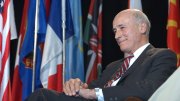David B. Yoffie, Starr professor of international business administration and senior associate dean and chair of executive education at Harvard Business School, addressed technological and economic engines for growth—and their prospective implications for how people work, study, and interact—as well as China’s new status as the fastest-growing market for and producer of technological products and services. (William Kirby had earlier noted, ruefully, that his cell-phone service worked better throughout China than on his daily 10-mile commute from home to campus in Cambridge.) The acceleration of innovations in management, technology, and collaboration in China would all have a significant effect on pushing the world forward, he said.
Yoffie cited four trends: mobility in computing (as is evident in the rapid adoption of the iPhone and its “apps”); the shift to “cloud” computing on centralized servers; social networking; and new services, such as visual search, which immediately change how work and teaching are done. The iPhone, he said, had been taken up into use more quickly than any previous technology. Social networking tools, such as Facebook or China’s Tencent (Facebook is blocked in the People’s Republic), had attracted 830 million unique users (suggesting that Yahoo and Google were already in eclipse). Combining these trends—mobility plus social networks plus cloud computing—yielded new location-based services (I’m here, what can I do, how can I navigate, what advertising would best be targeted to me at this moment) and emerging tools such as visual search (a Google application that will identify something from a picture and tell users about it and nearby things to do; a chess program that will advise on the next move from a picture of the playing board).
In the classroom, he said, the implications were already apparent, as students used more visual and real-time materials, and as instruction itself became global. Yoffie saw multiple avenues for fruitful collaboration between China and Harvard on all these opportunities, through the new center in Shanghai.








